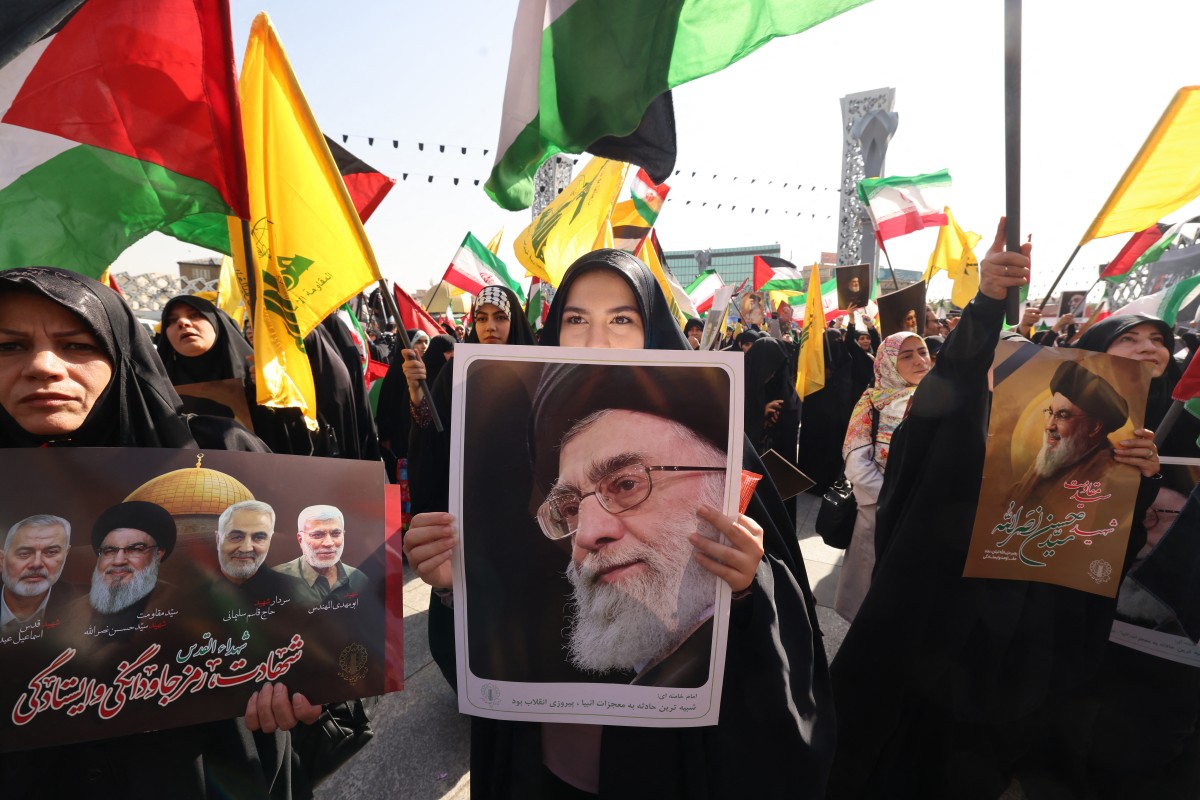Beirut, Lebanon — Iran’s supreme leader vowed in a rare address on Friday that his allies around the region would keep fighting Israel, as he defended his country’s missile strike on its arch-foe.
Ayatollah Ali Khamenei’s address in Tehran follows Iran’s second-ever direct attack on Israel and was also the first since exchanges of fire between Tehran-backed Hezbollah and Israeli troops escalated into full-blown war in Lebanon.
Speaking days ahead of the first anniversary of Hamas’s October 7 attack on Israel, Khamenei defended the Palestinian group’s “logical and legal” actions and hailed its “fierce defense” against Israeli forces.
Beyond Tehran, crowds of protesters gathered in Jordan and in Bahrain, which both have ties with Israel, after Friday prayers in a show of support for Hamas and Hezbollah.
In Amman, demonstrators carried portraits of militant leaders killed by Israel and posters hailing the October 7 attack as a “sign of pride, glory and dignity”.
Nearly a year into the Gaza war, Israel has shifted its focus to securing its border with Lebanon, to allow tens of thousands of Israelis displaced by cross-border rocket attacks by Hezbollah to return home.
The Israeli military launched a wave of strikes on Hezbollah strongholds around Lebanon, killing more than 1,000 people since September 23, according to the Lebanese health ministry, and forcing hundreds of thousands to flee their homes in a country already mired in economic crisis.
The attacks have killed an Iranian general, a host of Hezbollah commanders and, in the biggest blow to the group in decades, assassinated its leader, Hassan Nasrallah.
Speaking to a crowd of thousands in Farsi-speaking Iran, Khamenei said in Arabic: “The resistance in the region will not back down with these martyrdoms, and will win.”
The Iranian leader charged that Israel was a “malicious regime” which has “only kept itself standing by the injection of American support”.
It “will not last long”, he said.
The address came as Israel weighs retaliation for Hezbollah backer Iran’s missile attack which Tehran said was revenge for the killing of Nasrallah and other top figures.
Iran’s top diplomat, Abbas Araghchi, visited Beirut and said that his government backs “the efforts for a ceasefire” that would be acceptable to Hezbollah and come “simultaneously with a ceasefire in Gaza”.
Border crossing closed –
The escalation has left people in Lebanon fearful that there will be no swift end to the violence engulfing their country.
In Beirut, 35-year-old displaced nurse Fatima Salah said people were “scared for our children, and this war is going to be long”.
Israel and ally the United States have vowed response to the Iranian missile attack, which was largely intercepted but sparked fear in Israel.
Iran said it would step up its response if Israel counterattacked.
In Lebanon, Israeli bombardment has put three hospitals out of service, and on Friday a first delivery of medical aid organised by the United Nations reached Beirut airport.
Lebanon said an Israeli strike on Friday cut off the main international road to Syria, with Israel saying that Hezbollah was transporting weapons through the country’s principal land border crossing.
The strike comes after 310,000 people, mostly Syrians, have in recent days fled the war pitting Israel against Hezbollah in Lebanon for relative safety in neighbouring Syria.
The Israeli military said its fighter jets struck Hezbollah targets near the border crossing overnight including a tunnel that “enables the transfer and storage of large quantities of weapons”.
On the Israel-Lebanon border, the Israeli military said its forces had killed 250 Hezbollah fighters this week.
And in Hezbollah’s main bastion in Beirut’s southern suburbs, US and Israeli media reports said intense bombardment overnight targeted the militant group’s potential successor, Hashem Safieddine, just a week after Nasrallah’s killing.
The Israeli military has not commented on that strike, which destroyed at least five buildings and left a huge crater in the road, an AFP photographer said.
Gaza vaccination drive –
Israel announced this week that its troops had started ground raids into parts of southern Lebanon, a stronghold of Hezbollah, after days of heavy aerial bombardment.
Hezbollah said it shelled Israeli troops in a border area of south Lebanon Friday, in the latest such clash on the frontier.
The group also said it kept up its rocket fire, with sirens warning of incoming fire blaring in northern Israel Friday.
Lebanon’s health ministry said that 37 people were killed by Israeli strikes over the previous 24 hours.
The Israeli military said nine of its soldiers have been killed in combat in Lebanon.
In the West Bank, which is separated from Gaza by Israeli territory but has endured intense military raids throughout the war, the Palestinian health ministry said an air strike killed 18 people in the Tulkarem refugee camp.
A Palestinian security source told AFP it was the deadliest air raid in the occupied territory since 2000. The Israeli military said the strike targeted a local Hamas leader.
Calls for restraint have multiplied but months of similar calls to halt fighting in Gaza failed to bring a ceasefire.
The war has left the besieged territory’s 2.4 million facing a dire humanitarian crisis, and in August, the first polio case in 25 years was confirmed.
The World Health Organization said it hopes to give hundreds of thousands of children in Gaza a second dose of polio vaccine from October 14, after a first round last month.

